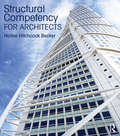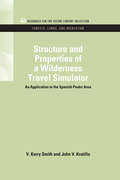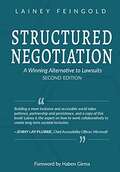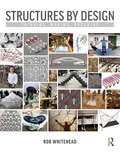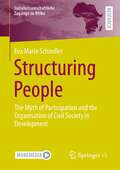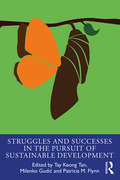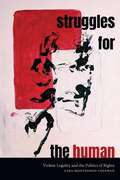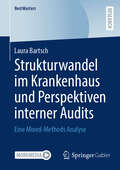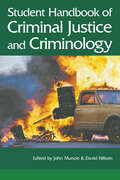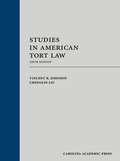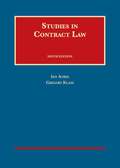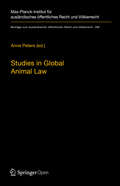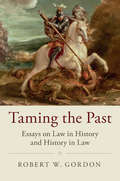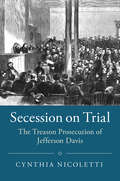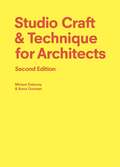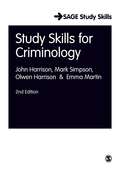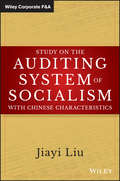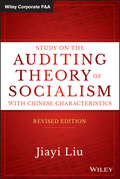- Table View
- List View
Structural Competency for Architects
by Hollee Hitchcock BeckerStructural Competency for Architects is a comprehensive volume covering topics from structural systems and typologies to statics, strength of materials, and component design. The book includes everything you need to know about structures for the design of components, as well as the logic for design of structural patterns, and selection of structural typologies. Organized into six key modules, each chapter includes examples, problems, and labs, along with an answer key available on our website, so that you learn the fundamentals. Structural Competency for Architects will also help you pass your registration examinations.
Structure and Properties of a Wilderness Travel Simulator: An Application to the Spanish Peaks Area (RFF Forests, Lands, and Recreation Set)
by John V. Krutilla V. Kerry SmithFirst Published in 2011. Routledge is an imprint of Taylor & Francis, an informa company.
Structured Negotiation: A Winning Alternative to lawsuits
by Lainey FeingoldLainey is the expert on how to work collaboratively to create long term societal inclusion.” — Jenny Lay-Flurrie, Chief Accessibility Officer, Microsoft “This fantastic guide to structured negotiations provides valuable insights for anyone interested in becoming a better advocate. I really enjoyed reading this book and appreciate all the lessons within.” — Haben Girma, Human rights lawyer and author of the best seller, Haben, the Deafblind Woman Who Conquered Harvard Law. ——— Structured Negotiation: A Winning Alternative to Lawsuits shares stories and strategies from 25 years of successful collaborations between the disability community and some of the largest public and private organizations in the United States. Born at the intersection of accessibility, technology, disability, and dispute resolution, the pioneering strategy described in this book has been instrumental in creating a more inclusive digital world for a quarter century. First published by the American Bar Association, the Second Edition includes new Structured Negotiation win-wins, other new content, and Forewords by Haben Girma, author of the best-selling Haben: The Deafblind Woman Who Conquered Harvard Law and by Susana Sucunza, Basque Country Spain collaborative lawyer and president of the Basque Country Collaborative Law Association. Not just for lawyers, the book offers an effective and path-breaking method to resolve disputes without lawsuits, and to lessen the conflict and expense of filed cases. Lawsuits play an important role in moving society forward. But the legal profession ― and the public it serves ― deserve less costly, less stressful, and more cooperative and ethical alternatives. Clients need a forum where stories matter. Would-be defendants need a process that allows them to do the right thing without having to prove there is no problem to begin with.
Structures by Design: Thinking, Making, Breaking
by Rob WhiteheadStructures by Design: Thinking, Making, Breaking is a new type of structures textbook for architects who prefer to learn using the hands-on, creative problem-solving techniques typically found in a design studio. Instead of presenting structures as abstract concepts defined by formulas and diagrams, this book uses a project-based approach to demonstrate how a range of efficient, effective, and expressive architectural solutions can be generated, tested, and revised. Each section of the book is focused on a particular manner by which structural resistance is provided: Form (Arches and Cables), Sections (Beams, Slabs, and Columns), Vectors (Trusses and Space Frames), Surfaces (Shells and Plates), and Frames (Connections and High-Rises). The design exercises featured in each chapter use the Think, Make, Break method of reiterative design to develop and evaluate different structural options. A variety of structural design tools will be used, including the human body, physical models, historical precedents, static diagrams, traditional formulae, and advanced digital analysis. The book can be incorporated into various course curricula and studio exercises because of the flexibility of the format and range of expertise required for these explorations. More than 500 original illustrations and photos provide example solutions and inspiration for further design exploration.
Structuring People: The Myth of Participation and the Organisation of Civil Society in Development (Sozialwissenschaftliche Zugänge zu Afrika)
by Eva Marie SchindlerParticipation has become an orthodoxy in the field of development, an essential element of projects and programmes. This book analyses participation in development interventions as an institutionalised expectation – a rationalized myth – and examines how organisations on different levels of government process it. At least two different objectives of participation are appropriate and legitimate for international organisations in the field: the empowerment of local beneficiaries and the achievement of programme goals. Both integrate participatory forums into the organisational logic of development interventions. Local administrations react to the institutionalised expectation with means-ends decoupling, where participatory forums are implemented superficially but de facto remain marginalised in local administrative processes and activities. The book furthermore provides a thick description of the organisationality of participation in development interventions. Participatory forums are shown to be a form of partial organisation. They establish an order in the relationship between administrations and citizens through the introduction of rules and the creation of a defined membership. At the same time, this order is found to be fragile and subject to criticism and negotiation.
Struggles and Successes in the Pursuit of Sustainable Development (The Principles for Responsible Management Education Series)
by Patricia M. Flynn Tay Keong Tan Milenko GudićThe challenges associated with the struggles for attainment of the Sustainable Development Goals (SDGs) and objectives are as diverse and complex as the variety of human societies, national conditions and natural ecosystems worldwide. Despite decades of economic growth and technological advances, our world is plagued by poverty, hunger, disease, conflicts and inequality, and many societies are under the strain of environmental changes and governance failure. Such global-scale challenges call for the SDGs to be translated beyond bold concepts and aspirational targets into concrete programs and feasible plans that are substantively valuable, locally acceptable, pragmatic and operationally implementable. In the pursuit of the SDGs, positive results are far from guaranteed. Success is uncertain. Instead, the path forward requires difficult learning, experimentation and adaptation by multiple stakeholders. Loss and sacrifice are foreseeable and often inevitable. This important book captures the lessons from ongoing struggles and the early successes. Productive failures and emerging practices are identified, analyzed and promulgated for interdisciplinary learning by, and for the inspiration of, like-minded individuals, organizations, communities and nations worldwide. They can also inform and enrich the curricula in universities, training institutions and schools to prepare future generations of citizens, leaders and activists with the ethos and values of sustainability and social responsibility. The book offers a platform for academics, practitioners and concerned global citizens to identify pathways forward on the immense challenges of sustainability.
Struggles for the Human: Violent Legality and the Politics of Rights (Global and Insurgent Legalities)
by Lara Montesinos ColemanIn Struggles for the Human, Lara Montesinos Coleman blends ethnography, political philosophy, and critical theory to reorient debates on human rights through attention to understandings of legality, ethics, and humanity in anticapitalist and decolonial struggle. Drawing on her extensive involvement with grassroots social movements in Colombia, Coleman observes that mainstream expressions of human rights have become counterparts to capitalist violence, even as this discourse disavows capitalism’s deadly implications. She rejects claims that human rights are inherently tied to capitalism, liberalism, or colonialism, instead showing how human rights can be used to combat these forces. Coleman demonstrates that social justice struggles that are rooted in marginalized communities’ lived experiences can reframe human rights in order to challenge oppressive power structures and offer a blueprint for constructing alternative political economies. By examining the practice of redefining human rights away from abstract universals and contextualizing them within concrete struggles for justice, Coleman reveals the transformative potential of human rights and invites readers to question and reshape dominant legal and ethical narratives.
Strukturwandel im Krankenhaus und Perspektiven interner Audits: Eine Mixed-Methods Analyse (BestMasters)
by Laura BartschDer Gesundheitssektor steht vor komplexen Herausforderungen und Veränderungen, die durch dynamische Umstrukturierungen bewältigt werden können. Eine agile Arbeitsweise ermöglicht hierbei eine flexible Anpassungsfähigkeit. Besonders im Fokus steht das Qualitätsmanagement in Krankenhäusern, wobei interne Audits und deren Prüfprozesse betrachtet werden. Um die Patienten- und Qualitätssicherung zu optimieren und auf kontinuierliche Veränderungen zu reagieren, bietet die agile Auditierung mit einem iterativen Ansatz großes Potenzial.
Student Handbook of Criminal Justice and Criminology
by John Muncie David WilsonWritten by some of the leading criminologists in the country, this new title is a 'one-stop shop' for those who teach, study or are interested in criminology and the criminal justice systems of the UK.
Students, Colleges, and Disability Law
by Stephen B. ThomasThis text examines the obligations and rights of students with disabilities and the institutions they attend in higher education, including guidelines for university administrators.
Studies In Contract Law (University Casebook)
by Ian Ayres Gregory KlassIn the Ninth Edition of Studies in Contract Law, Ian Ayres and Greg Klass have continued their work of streamlining, updating and supplementing this classic casebook. The new edition includes extensive discussion of the Draft Restatement (Third) of Consumer Contracts. There are new cases on telemarketing, good faith, the perfect tender rule, warranties and reliance, half-truths, fraud liability between contracting parties, class arbitration, adequate assurances, mitigation, mental anguish, intentional interference, and personal services contracts. And the authors have added three new drafting exercises to the many practice problems that the book has always included.
Studies in Global Animal Law (Beiträge zum ausländischen öffentlichen Recht und Völkerrecht #290)
by Anne PetersThis open access book contains 13 contributions on global animal law, preceded by an introduction which explains key concepts and methods. Global Animal Law refers to the sum of legal rules and principles (both state-made and non-state-made) governing the interaction between humans and other animals, on a domestic, local, regional, and international level. Global animal law is the response to the mismatch between almost exclusively national animal-related legislation on the one hand, and the global dimension of the animal issue on the other hand. The chapters lay some historical foundations in the ius naturae et gentium, examine various aspects of how national and international law traditionally deals with animals as commodity; and finally suggest new legal concepts and protective strategies. The book shows numerous entry points for animal issues in international law and at the same time shifts the focus and scope of inquiry.
Studies in Legal History: Criminal Law in Liberal and Fascist Italy
by Paul GarfinkelBy extending the chronological parameters of existing scholarship, and by focusing on legal experts' overriding and enduring concern with 'dangerous' forms of common crime, this study offers a major reinterpretation of criminal-law reform and legal culture in Italy from the Liberal (1861-1922) to the Fascist era (1922-43). Garfinkel argues that scholars have long overstated the influence of positivist criminology on Italian legal culture and that the kingdom's penal-reform movement was driven not by the radical criminological theories of Cesare Lombroso, but instead by a growing body of statistics and legal researches that related rising rates of crime to the instability of the Italian state. Drawing on a vast array of archival, legal and official sources, the author explains the sustained and wide-ranging interest in penal-law reform that defined this era in Italian legal history while analyzing the philosophical underpinnings of that reform and its relationship to contemporary penal-reform movements abroad.
Studies in Legal History: Essays on Law in History and History in Law (Studies in Legal History)
by Gordon Robert W.Lawyers and judges often make arguments based on history - on the authority of precedent and original constitutional understandings. They argue both to preserve the inspirational, heroic past and to discard its darker pieces - such as feudalism and slavery, the tyranny of princes and priests, and the subordination of women. In doing so, lawyers tame the unruly, ugly, embarrassing elements of the past, smoothing them into reassuring tales of progress. In a series of essays and lectures written over forty years, Robert W. Gordon describes and analyses how lawyers approach the past and the strategies they use to recruit history for present use while erasing or keeping at bay its threatening or inconvenient aspects. Together, the corpus of work featured in Taming the Past offers an analysis of American law and society and its leading historians since 1900.
Studies in Legal History: Fractional Freedoms
by Mckinley Michelle A.Fractional Freedoms explores how thousands of slaves in colonial Peru were able to secure their freedom, keep their families intact, negotiate lower self-purchase prices, and arrange transfers of ownership by filing legal claims. Through extensive archival research, Michelle A. McKinley excavates the experiences of enslaved women whose historical footprint is barely visible in the official record. She complicates the way we think about life under slavery and demonstrates the degree to which slaves were able to exercise their own agency, despite being ensnared by the Atlantic slave trade. Enslaved women are situated as legal actors who had overlapping identities as wives, mothers, mistresses, wet-nurses and day-wage domestics, and these experiences within the urban working environment are shown to condition their identities as slaves. Although the outcomes of their lawsuits varied, Fractional Freedoms demonstrates how enslaved women used channels of affection and intimacy to press for liberty and prevent the generational transmission of enslavement to their children.
Studies in Legal History: The Old English Penitentials and Anglo-Saxon Law
by Stefan JurasinskiSome of the earliest examples of medieval canon law are penitentials - texts enumerating the sins a confessor might encounter among laypeople or other clergy and suggesting means of reconciliation. Often they gave advice on matters of secular law as well, offering judgments on the proper way to contract a marriage or on the treatment of slaves. This book argues that their importance to more general legal-historical questions, long suspected by historians but rarely explored, is most evident in an important (and often misunderstood) subgroup of the penitentials: composed in Old English. Though based on Latin sources - principally those attributed to Theodore, Archbishop of Canterbury (d. 690) and Halitgar of Cambrai (d. 831) - these texts recast them into new ordinances meant to better suit the needs of English laypeople. The Old English penitentials thus witness to how one early medieval polity established a tradition of written vernacular law.
Studies in Legal History: The Treason Prosecution of Jefferson Davis (Studies in Legal History)
by Cynthia NicolettiThis book focuses on the post-Civil War treason prosecution of Confederate President Jefferson Davis, which was seen as a test case on the major question that animated the Civil War: the constitutionality of secession. The case never went to trial because it threatened to undercut the meaning and significance of Union victory. Cynthia Nicoletti describes the interactions of the lawyers who worked on both sides of the Davis case - who saw its potential to disrupt the verdict of the battlefield against secession. In the aftermath of the Civil War, Americans engaged in a wide-ranging debate over the legitimacy and effectiveness of war as a method of legal adjudication. Instead of risking the 'wrong' outcome in the highly volatile Davis case, the Supreme Court took the opportunity to pronounce secession unconstitutional in Texas v. White (1869).
Studies in Legal History: Women and Justice for the Poor
by Felice BatlanThis book re-examines fundamental assumptions about the American legal profession and the boundaries between 'professional' lawyers, 'lay' lawyers, and social workers. Putting legal history and women's history in dialogue, it demonstrates that nineteenth-century women's organizations first offered legal aid to the poor and that middle-class women functioning as lay lawyers, provided such assistance. Felice Batlan illustrates that by the early twentieth century, male lawyers founded their own legal aid societies. These new legal aid lawyers created an imagined history of legal aid and a blueprint for its future in which women played no role and their accomplishments were intentionally omitted. In response, women social workers offered harsh criticisms of legal aid leaders and developed a more robust social work model of legal aid. These different models produced conflicting understandings of expertise, professionalism, the rule of law, and ultimately, the meaning of justice for the poor.
Studies on International Courts and Tribunals: The Legitimacy of International Criminal Tribunals
by Joanna Nobuo Hayashi Bailliet Cecilia M. Nicholson Cecilia M. Joanna NicholsonWith the ad hoc tribunals completing their mandates and the International Criminal Court under significant pressure, today's international criminal jurisdictions are at a critical juncture. Their legitimacy cannot be taken for granted. This multidisciplinary volume investigates key issues pertaining to legitimacy: criminal accountability, normative development, truth-discovery, complementarity, regionalism, and judicial cooperation. The volume sheds new light on previously unexplored areas, including the significance of redacted judgements, prosecutors' opening statements, rehabilitative processes of international convicts, victim expectations, court financing, and NGO activism. The book's original contributions will appeal to researchers, practitioners, advocates, and students of international criminal justice, accountability for war crimes and the rule of law.
Studio Craft & Technique for Architects Second Edition
by Anne Gorman Miriam DelaneyThis one-stop handbook for architecture students provides step-by-step techniques for perfecting the vital skills of drawing, model making and surveying. It is a primer on the conventions of architectural representation and the use of materials. It also explains the primary elements of construction and structure from first principles, using clear diagrams and drawings. Recommended in the first year at numerous architecture schools, this second edition has been updated to include a new section on sustainability, more on types of drawing and when to use them, and more on structural principles and materials.
Studio Craft & Technique for Architects Second Edition
by Anne Gorman Miriam DelaneyThis one-stop handbook for architecture students provides step-by-step techniques for perfecting the vital skills of drawing, model making and surveying. It is a primer on the conventions of architectural representation and the use of materials. It also explains the primary elements of construction and structure from first principles, using clear diagrams and drawings. Recommended in the first year at numerous architecture schools, this second edition has been updated to include a new section on sustainability, more on types of drawing and when to use them, and more on structural principles and materials.
Study Skills for Criminology (SAGE Study Skills Series)
by Dr Mark Simpson Olwen Harrison Mr John Harrison Ms Emma MartinThe new edition of this best-selling study skills book provides a practical guide for success for individuals at every level of their criminology and criminal justice degree. The new edition of this best-selling study skills book is a practical guide to success for individuals at every level of their criminology and criminal justice degree. Fully revised to reflect changes in the curriculum, the book continues to provide students with practical and relevant information for their degree, including topics on choosing modules, sourcing and researching, applying theory to practice, writing essays, presentation skills, revision, taking exams and careers after your degree. New to the second edition: o a chapter on plagiarism o developments in virtual learning environments and e-resources o expanded coverage of internet and e-learning skills o advice on moving from A-level to university. Maintaining its student-friendly approach and useful pedagogy - tips, activities, glossary, key terms and issues - Study Skills for Criminology is an essential purchase for any student of criminology or criminal justice looking to excel in their degree. SAGE Study Skills are essential study guides for students of all levels. From how to write great essays and succeeding at university, to writing your undergraduate dissertation and doing postgraduate research, SAGE Study Skills help you get the best from your time at university.John Harrison, formerly of Teesside University. Mark Simpson is Dean of the School of Social Sciences and Law at Teesside University. Olwen Harrison, formerly of Teesside University. Emma Martin is Senior Lecturer in Criminology at Teesside University.
Study on the Auditing System of Socialism with Chinese Characteristics
by Jiayi LiuA comprehensive, authoritative examination of Chinese auditing practices Study on the Auditing System of Socialism with Chinese Characteristics provides unprecedented insight into China's current audit process, with expert contributions and predictions of future trends. Author Jiayi Liu is the Auditor General of the National Audit Office of the People's Republic of China, and the current chairman of the governing boards of the International Organizations of Supreme Audit Institutions; in this book, he draws upon his vast experience to help you better understand China's unique approach to auditing. Contributions from senior auditors across the China National Audit Office share deep insight into the system's framework, features, and development, providing a comprehensive, systematic examination of current, past, and future practices. As a leading global auditing authority, Liu is the ideal source of information and clarity on China's auditing system. This book opens up the practices, processes, and foundational aspects of this complex system to provide insight for those doing business in China. Understand the foundation of the Chinese auditing system Learn how the system was created and developed over time Delve into the system's framework and detailed features Gain first-hand insight into China's auditing experience Developed as a companion to Study on the Auditing Theory of Socialism with Chinese Characteristics, this book expands upon the system's basic foundations to show how theory translates into practice. Companies who do business in China need a working knowledge of the system, and a scientific examination from the definitive authority provides a level of insight you won't find anywhere else. Study on the Auditing System of Socialism with Chinese Characteristics is the essential primer to the Chinese audit.
Study on the Auditing Theory of Socialism with Chinese Characteristics, Revised Edition
by Jiayi LiuA comprehensive guide to China's public, private, and internal audit system Study on the Auditing Theory of Socialism with Chinese Characteristics provides a comprehensive overview of China's auditing practices. Recent years have seen the National Audit Office of China (CNAO) making remarkable headway not only in China by guaranteeing the healthy operation of the economy and society and improving national governance through government auditing, but also in the international arena by carrying out audits with the United Nations. With constant development in the practice, an audit theory with socialist Chinese characteristics has taken shape, centering on the premise that government auditing serves as the cornerstone and safeguard of national governance. At the XXI INCOSAI held in 2013 in Beijing, the theme of "national audit and national governance" proposed and chaired by CNAO, was met with widespread approval by participants from over 160 countries, and led to the endorsement of the Beijing Declaration, which makes it a priority and target for audit institutions to promote good national governance. To explore the nature and development of government auditing, this book probes into the history and reality, and theories and practices of auditing in various countries, and puts forward the assertion that, "as a cornerstone and important safeguard for national governance, government auditing is an 'immune system' endogenous within the synthetical system of national governance, with functions of precaution, revelation and defense." Furthermore, China's socialist auditing theory has been elaborated in nine aspects, nature, functions, goals, features, methods, management, framework of regulations and standards, IT application and culture, covering the new concepts, methodologies, techniques and achievements of China's government auditing. This book is highly relevant, practical, and readable. Jiayi Liu, the chief author, is the Auditor General of China and the current Chairman of INTOSAI Governing Board. In 2013 he won the United Nations Peace Prize in recognition of his auditing work for UN peacekeeping operations.
